- Home
- M. L. Buchman
The Complete Delta Force Shooters Page 10
The Complete Delta Force Shooters Read online
Page 10
Two small rooms were connected by an archway. It was surprisingly tidy, the hard-packed dirt floor had no buildup of sand from the notorious dust storms. In the front room a battered table, two benches, and three chairs with the backs broken off were neatly arranged. The second room—empty but clean and where they’d be sleeping—showed fresh sweeping marks and not a camel spider or scorpion in sight despite the cool shade.
The other five members of his team surged in out of the midday heat and began dumping heavy packs and bedrolls in the open room.
No one else paid any attention to the cleaning woman. She squatted in a small nook that had a smoky fireplace for burning cow dung and a spot only wide enough for the woman to squat while cooking or lie down and sleep, but not both. She clutched the bundle of bound twigs that was her broom like it was a lifeline—her knuckles white.
She barely looked up as they entered. At his greeting, she’d looked down once more. Abashed to be an Afghan woman alone with six American soldiers? Or too unintelligent to care? Perhaps a third option.
Command had told them they’d have local help which was a bonus. It meant they wouldnt’t be living on MREs. She’d know how to shop and cook local chow and he was fine with that. Maxwell and Jaffe, fresh out of training, were new to the squad and it would take them some time squatting over the shitter to build up the right gut flora, but he and the other three operators had walked these roads before and were happy enough to eat local as long as it took no effort on their part.
For himself, a boy raised on pasta and beef in upstate New York, he looked forward to the Afghan cuisine. On previous tours he’d grown a taste for the clean, simple flavors of fresh-baked naan seed bread, rice with tomatoes or lamb and raisins, and Qorma stew. He hoped she was a good cook.
They’d been offered a bunkhouse at Camp Bastion-Leatherneck (now Camp Shorabak), but preferred to be outside anyone else’s perimeter—especially the Afghan Armed Forces. They’d been labeled as advisors, but the form of “advice” they were bringing didn’t include being in contact with the local forces.
He could see the others assess and forget the servant. Within days they’d think nothing of undressing and crawling into the sack while she puttered about. If she was offended, it would be up to her to leave the room.
“Nothing but wallpaper, man.”
Except she wasn’t.
Chris noticed that her head scarf was decorative and of the highest quality, or had once been. It was worn thin and time-faded, but it wasn’t the scarf of the poorest classes. Its unusual shade of summer green still shone through. Her one vanity left from a former existence? Or stolen from an abandoned home, thoughtlessly left behind years ago by someone with enough money to flee? She posed a lot of questions for him if not for the others.
He didn’t make a deal of it, but assigned himself first guard detail and kept an eye out.
She revealed herself in stages as the others sorted gear, shot the shit, and settled in after the long flight. They’d come in on the biweekly commercial flight in ones and twos dressed as Arab businessmen. They’d grabbed boxes from the cargo that hadn’t looked related—their weapons had been in his box labeled as tractor parts. Conway’s box was restaurant supply, a month of MREs that they could now not eat. Baxter and Burton smuggled in the comm and surveillance gear and Maxwell and Jaffe, being the new guys, were mainly loaded down with heavy rounds of ammunition and explosives.
As the guys settled, Chris noticed the woman didn’t leave the room at random. Rather she found additional tasks until some story was complete: a story told in a language that she had pretended was gibberish to her.
And when she did move, it wasn’t with the slow, painful moves of the crone that most of her attire suggested. Nor was it that of a teen. Their servant was a woman who understood English and was intent on keeping that knowledge to herself.
It took a full day before he managed to see her face as she consistently looked down and kept her scarf forward. Every now and then he’d catch her watching them, but she always looked away the moment he turned to face her. Unable to get a good view of her face, Chris settled on subterfuge, walking close by her and dropping a spoon.
He squatted directly in front of her as she reached for it. Her face—damn but this woman had a face. Clear skin brushed golden-brown, prominent cheekbones, and strong eyebrows that only emphasized the clear dark eyes. The hand that returned the spoon was dirty, but strong and unlined.
He almost said, “Thank you” in Pashto, but at the last moment he switched from “Ddera manena” to the Dari “Tashakor,” Something about the strength of her face perhaps, or the fullness of her tightly closed mouth.
“Qabele tashakor nest.” She looked shocked by her own “You’re welcome.” She too had spoken in Dari rather than offering the more likely “Har kela” in Pashto. Her voice was warm and smooth, with just a little roughness as if she used it only rarely.
In an eyeblink she was gone, not just from the room, but from the house.
Her response meant Dari was probably her native tongue. That would place her home in northern Afghanistan, if she was even Afghani. How had the poor woman ended up in the desert of the far south as a servant? There was no worse place that the country had to offer than Helmand Province. He knew. He’d fought in most of them.
2
Azadah stood by the well, but had brought no water container.
She could go to the market, but it was a long walk and she had just gone this morning to prepare for the American’s arrival. It wouldn’t matter; the stalls would now be closed in the heat of midday. She had paid a bribe to get the position—a bribe that was only shocking in how meager it had needed to be. How far she had fallen, nothing left but her clothing and her pride.
She stared out at the empty airport. It shimmered in the dry heat. The place where so many planes used to land that there was never silence in Lashkar Gah was now filled only with the wind and the one lone passenger plane that would be leaving soon. That plane was the only safe way to cross back to Kandahar or Kabul—if one had the money. The roads were filled with Afghan checkpoints, Taliban ambushes, and shifting sands.
The American Air Force had staged here and supplied the Marine Corps troops stationed at the great camp north of the city. The British too had been here. They had tried to bring peace. Instead they had given the Taliban a focus and Lashkar Gah had been shredded time after time between the two forces. Now the Taliban came and the Afghan Armed Forces fought them off, but there was little enthusiasm on either side.
But the Americans were back.
There were so few of them, what could they think to accomplish here?
And by asking the question, she knew.
Azadah tipped her head back to look at the skies wondering if she could see it. She couldn’t, but didn’t doubt that it was there. A drone, impossibly small and far away, circled somewhere above them. Was it looking down at her right now?
“They’re very hard to spot,” a voice said close behind her.
She looked back down from the sky and was momentarily dizzy. The one they called “Deuce,” the one who had tricked her into speaking, had put on a shalwar kameez. In the linen drawers and long body shirt, he looked almost native. His beard was short and neat, his hair dark. Only the light brown of his eyes seemed out of place. They were as light as the desert at dusk.
“But they can see us?” Only after she spoke did she realize that again he had tricked her. He had spoken in English and she had replied in the same language.
She had not been caught in years. The last time had earned her a crashing hard slap across the face from an Afghan guard and three months in a prison cell while they debated whether or not to shoot her for spying. The Americans had freed her only when they were recalled back to their country and she could no longer be a threat to them. For a time she feared they would forget about her at the last minute, or perhaps remember. In the end it was as if the three months of her life became nothing.
&nb
sp; Azadah prepared to run toward the market, not that she had much hope of losing herself there. Even the watching eye above them would not be needed. She had seen that the man was fleet of foot and he was most certainly armed. This one would have at least three weapons with him: ankle, hip, and at the center of his belly where he could draw it so fast that all she could see was a blur when he did so. He did not have his rifle with him for all of the good it would do her.
But he did not reach for her. He did not slip a hand into his clothing to hold a weapon. He did not appear smug about uncovering her secret. Instead he stood quietly and watched her, waiting until she spoke again.
“What is Deuce? I do not know this word.”
“Deuce? It is a playing card for a game with two markers on it. My initials are C. C., Chris Cooper, and they called me that at first. Then ‘Two C.’ On my third mission, the situation got a little ugly. I solved it by killing two people with one bullet. Luck as much as anything. ‘Two C.’ became ‘Deuce’ and it stuck.”
His casual tone reassured her as much as anything. “I don’t think luck has much to do with your life.”
His shrug said maybe. “I met you.”
“I work here.”
“You are also at the wrong end of your country and speak excellent English.”
Not knowing what else to say, Azadah repeated herself, “I work here.” These were more words than she had spoken in any language in a year and it was exhausting.
“Who do you work for is the next question.”
Security. It is always security. Her country no longer spoke of the seasons or the crops. There was less concern for the next dust storm or the birth of a child than of who was aligned with who. There was only, always, security. She was sick of it.
“I speak to no one.”
“You’re speaking to me. I guess that makes me no one,” he managed to sound hurt.
And she almost smiled, but she was too out of practice. “Yes, it is as I said. I speak to no one. I work here.”
“Cleaning?”
“Yes.”
“And cooking?”
“Yes, and carrying water.”
“Which you must carry in your cupped palms,” he pointed at her empty hands.
“And I watch men itch and scratch while they have nothing to do,” she shot back at him, piqued at being caught. She did not like that he knew exactly how much he had surprised her.
“I’m talking to you. That counts as doing something.”
Azadah stared at him for a long moment. This man they called Two C.—she did not like the way “Deuce” felt on her tongue—was talking to her. He was not interrogating her. He had not struck her or arrested her. He was talking to her. He already knew more about her than she had revealed to anyone in a long time.
Did he somehow also know that her parents had fled Iran during the fall of the Shah and their great mistake had been fleeing to the east? They had arrived in Afghanistan at the same time as the Russians. She’d been born in the midst of “Russia’s Vietnam,” a fifteen-year disaster for both countries in which a million Afghan civilians were killed and six million fled their homeland entirely.
Rushing to the relative safety of the mujahideen, they had served as skilled administrators. The American-backed rebels’ success against the Russians had come to nothing when the tribes then fell to fighting among themselves.
Then Mohammed Omar had taken those hard-learned fighting skills and leftover American weaponry and formed the Taliban. Another half-million Afghans had died, including her parents, before Osama bin Laden’s bombing of New York had forced the Americans to face what they had helped create.
In each incarnation, Azadah’s lot had slipped lower and lower. She’d been born to senior government officials. She’d grown up in the administration centers of a nationwide insurgency. She had cowered during the rule of the Taliban as a clerk; invaluable because she knew everyone and every connection, reviled because of her sex.
And now she had become a cleaner and cook for this man.
He was not a big man, no more than any Afghan. She was tall for a woman and only had to look upward a hand’s width when speaking with him.
“Why are you here, Two C.? Why have you Americans come back?”
His smile acknowledged her preference for his older nickname. He pointed to the scant shade afforded by the side of a house. There was no roof and through the windows there was only rubble—a casualty of the 2008 Taliban bombardment of the city. She couldn’t remember the family who’d lived there and that bothered her. It was as if she’d just become disconnected from her own country.
She followed him there out of the sun. She’d forgotten how much the Americans hated the heat and the brightness. He did not stand too close. It wouldn’t be right. If she were anybody, she might be shunned by the community for even speaking with a lone male—and if the Taliban were in control she might be beaten or even killed—but she wasn’t and for the moment they weren’t, so perhaps it didn’t matter.
“We are here,” he told her once they were settled, “because the Taliban see the weaknesses in the Afghan Armed Forces as opportunity. We have learned that great force is not the answer here. It was me and people like me who cut the head off the snake. We have come to do it again.”
Azadah leaned back against the wall suddenly tired of it all. She had fought so long, her family had given so much, and once more they had come full circle.
This man from a land so foreign she could scarcely imagine it had left his home and come back to Afghanistan.
“The head of this snake will always grow anew.” Perhaps he heard the resignation in her voice, the hopeless battle that was Afghanistan. Her country had once been rich in art and literature, if not money. Now, after forty years of war, the country barely had buildings.
“Then,” Two C. said with a calm confidence that forced her to look back at his quiet face. “We will come back and cut it off again.”
3
Chris knew not to trust a pretty face—no matter how goddamn striking—he hadn’t joined the service just yesterday.
But he considered himself a better than average judge of human character, and there were things about his woman that didn’t fit together. At least not if she was a spy, infiltrator, or saboteur.
“May I ask your name?”
“Azadah. So true, is it not?” Despite her obvious soul-deep weariness, she was still capable of humor.
Her name: independent, free.
She struck him as a woman trapped…but not subdued. Qawi perhaps. The word meant both strong and powerful. But manda as well, so weary that she could scarce stand under her own weight.
He’d done many tours in Iraq and Afghanistan. Handled more than a few operations in places better not mentioned beyond the borders of Iran and Pakistan. In some places no Arab woman would think to speak with him.
Yet Azadah spoke with him. And she showed of herself who she was.
“I’m inclined to trust you, Azadah.”
“I am trustworthy,” she said without looking at him. “Or I was. Now I no longer know. I do what I do.”
He too leaned back against the mud wall to look out across the area. This whole section of houses had been abandoned. Storms had piled the dust in odd drifts against the few remaining walls. But, like any poor culture, anything that could be salvaged had been. There was little waste, merely the tan-dusted wreckage of what had once been a community.
The city of Lashkar Gah had grown from two-hundred thousand to two-fifty over the last decade, but still that had not been enough to push people back into this ravaged corner of the older city. Dating back a thousand years, the city’s ill-fated name translated as “Army Barracks” and described only too well its war-torn history.
The brush of a breeze invaded their bit of stolen shade with a slap of heat that experience told him he would never fully adapt to in their time here.
“The place I come from is a land of water and trees,” he didn’t know q
uite why he was telling her this. “It is called the Finger Lakes and is in the far west of our New York State. The lakes are long, thin, and spread like a hand. The country is so beautiful that the local tribes said it was where God rested his hand after finishing creation.” He could almost see it, laid like a green mirage over the desolate land before him.
She did not answer for a very long time. When she did, her words were almost a soft caress.
“Thank you. I can almost see your land of green. It is good to believe such places exist.”
And then, in that way she had, Azadah was gone and he stood alone in the shrinking wedge of shade formed by a broken wall.
4
Three days later Chris found a slip of paper on his pillow. It lay so close to his nose that it should have tickled.
It was an address and a name. A name that had him sitting up sharply and not bothering to wonder how the paper had arrived there without him waking. Abdullah bin Hazar wasn’t at the top of their target list, but he wasn’t at the bottom either.
Chris snapped his fingers and the rest of the team came awake. Maxwell had been on guard, in between predictable trips to the shitter. Somehow he too had missed the delivery of the slip of paper. Because, Chris knew, no one but him saw Azadah, now a fixture in their midst.
She had been so stealthy that she hadn’t disturbed his sleep, which made him uncomfortable. He preferred the idea that she was already a familiar presence in his mind so that his unconscious vigilance had let her come so close. They had not spoken again, but he couldn’t help tracking her movements whenever she was in or near the building. She revealed the depth of their mutual awareness when he would glance around unexpectedly and find her watching him. At first, her gaze had flinched away, but just last night she had watched him for a long moment before, he’d swear, she’d blushed and looked down.

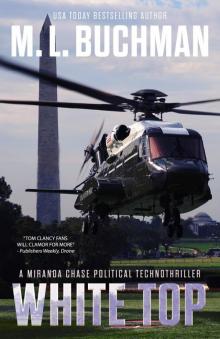 White Top
White Top Thunderbolt
Thunderbolt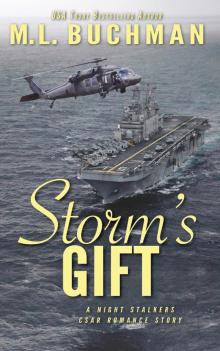 Storm's Gift
Storm's Gift The Complete Delta Force Shooters
The Complete Delta Force Shooters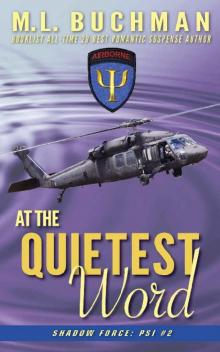 At the Quietest Word (Shadowforce: Psi Book 2)
At the Quietest Word (Shadowforce: Psi Book 2) At the Slightest Sound
At the Slightest Sound Dilya's Christmas Challenge
Dilya's Christmas Challenge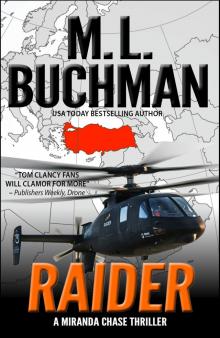 Raider
Raider Havoc
Havoc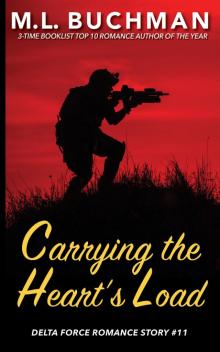 Carrying the Heart's Load
Carrying the Heart's Load Flying Beyond the Bar
Flying Beyond the Bar Firelights of Christmas
Firelights of Christmas Where Dreams Are Well Done
Where Dreams Are Well Done Nathan's Big Sky
Nathan's Big Sky Heart of a Russian Bear Dog
Heart of a Russian Bear Dog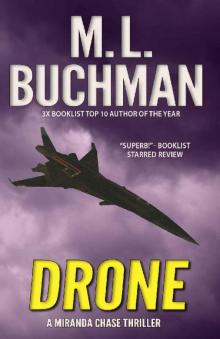 Drone: an NTSB / military technothriller (Miranda Chase Book 1)
Drone: an NTSB / military technothriller (Miranda Chase Book 1) Flower of Destiny
Flower of Destiny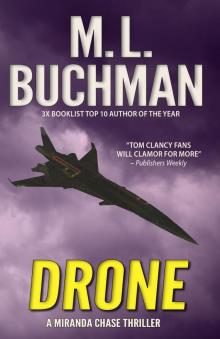 Drone
Drone Ghostrider: an NTSB-military technothriller (Miranda Chase Book 4)
Ghostrider: an NTSB-military technothriller (Miranda Chase Book 4) Wild Fire
Wild Fire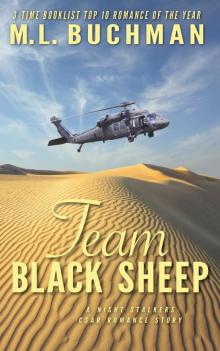 Team Black Sheep
Team Black Sheep The Complete Delta Force Warriors
The Complete Delta Force Warriors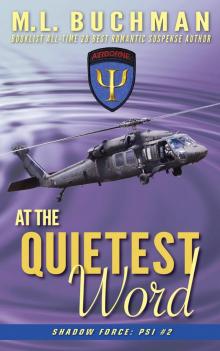 At the Quietest Word
At the Quietest Word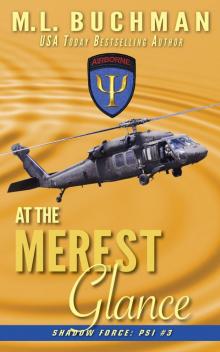 At the Merest Glance
At the Merest Glance Havoc: a political technothriller (Miranda Chase Book 7)
Havoc: a political technothriller (Miranda Chase Book 7)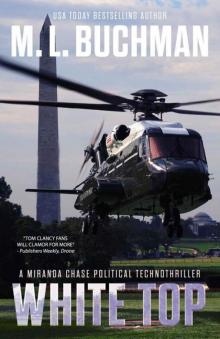 White Top: a political technothriller (Miranda Chase Book 8)
White Top: a political technothriller (Miranda Chase Book 8)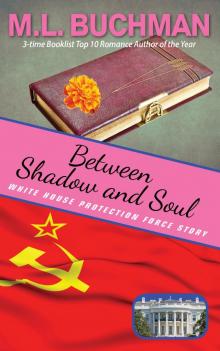 Between Shadow and Soul
Between Shadow and Soul Island Christmas
Island Christmas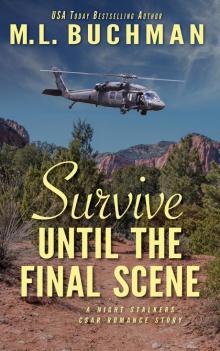 Survive Until the Final Scene
Survive Until the Final Scene Midnight Trust
Midnight Trust Return to Eagle Cove
Return to Eagle Cove Where Dreams Reside
Where Dreams Reside Honor Flight
Honor Flight Where Dreams Are Sewn
Where Dreams Are Sewn The Complete Hotshots
The Complete Hotshots Condor
Condor I Own the Dawn
I Own the Dawn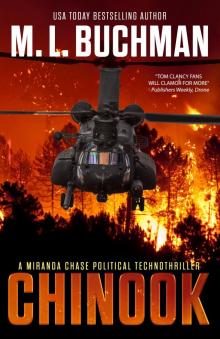 Chinook
Chinook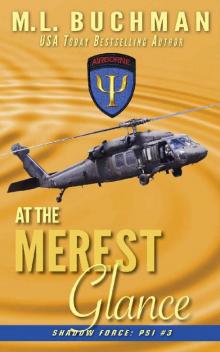 At the Merest Glance: a military paranormal romance (Shadowforce: Psi Book 3)
At the Merest Glance: a military paranormal romance (Shadowforce: Psi Book 3) Since the First Day
Since the First Day Thunderbolt: an NTSB / military technothriller (Miranda Chase Book 2)
Thunderbolt: an NTSB / military technothriller (Miranda Chase Book 2) For Her Dark Eyes Only
For Her Dark Eyes Only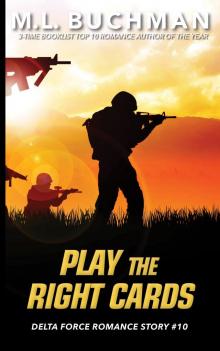 Play the Right Cards
Play the Right Cards Lost Love Found in Eagle Cove
Lost Love Found in Eagle Cove Big Sky Ever After: a Montana Romance Duet
Big Sky Ever After: a Montana Romance Duet Keepsake for Eagle Cove
Keepsake for Eagle Cove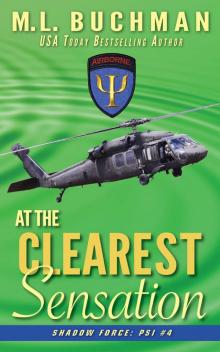 At the Clearest Sensation
At the Clearest Sensation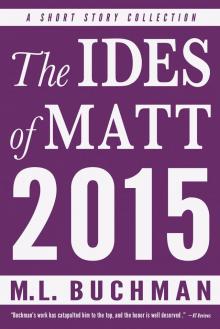 The Ides of Matt 2015
The Ides of Matt 2015 When They Just Know
When They Just Know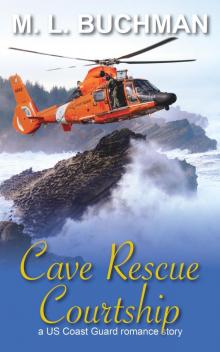 Cave Rescue Courtship
Cave Rescue Courtship Wildfire at Dawn
Wildfire at Dawn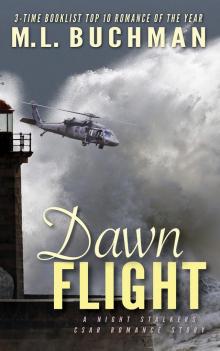 Dawn Flight
Dawn Flight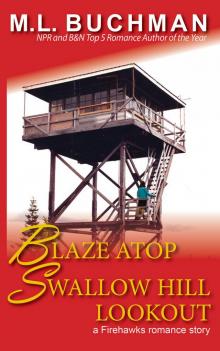 Blaze Atop Swallow Hill Lookout
Blaze Atop Swallow Hill Lookout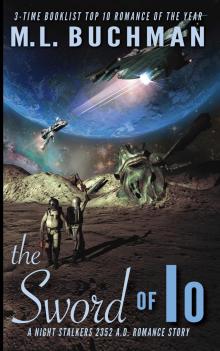 The Sword of Io
The Sword of Io Christmas at Steel Beach
Christmas at Steel Beach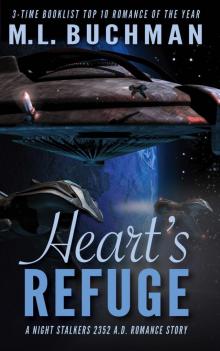 Heart's Refuge
Heart's Refuge By Break of Day (The Night Stalkers)
By Break of Day (The Night Stalkers)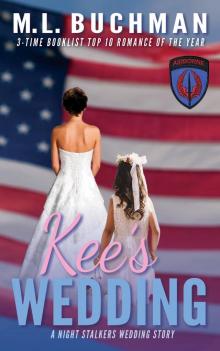 Kee's Wedding
Kee's Wedding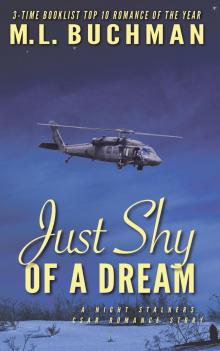 Just Shy of a Dream
Just Shy of a Dream Path of Love
Path of Love Ghost of Willow's Past
Ghost of Willow's Past Flash of Fire
Flash of Fire Target of the Heart
Target of the Heart Sound of Her Warrior Heart
Sound of Her Warrior Heart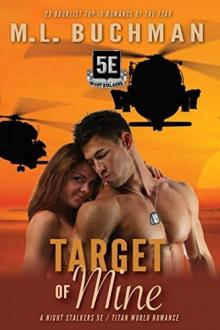 Target of Mine: The Night Stalkers 5E (Titan World Book 2)
Target of Mine: The Night Stalkers 5E (Titan World Book 2) The Complete Where Dreams
The Complete Where Dreams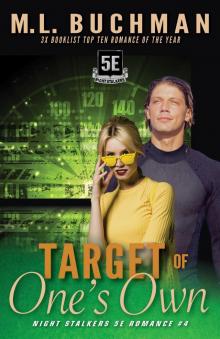 Target of One's Own
Target of One's Own For All Their Days
For All Their Days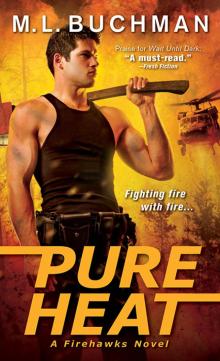 Pure Heat
Pure Heat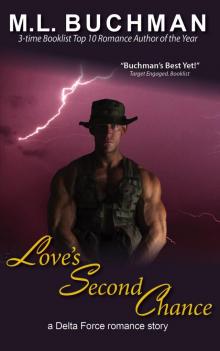 Love's Second Chance
Love's Second Chance Target Engaged
Target Engaged Bring On the Dusk
Bring On the Dusk Wait Until Dark (The Night Stalkers)
Wait Until Dark (The Night Stalkers) Big Sky, Loyal Heart
Big Sky, Loyal Heart Welcome at Henderson's Ranch
Welcome at Henderson's Ranch Damien's Christmas
Damien's Christmas Flight to Fight
Flight to Fight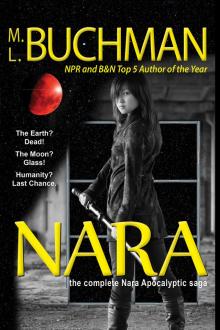 Nara
Nara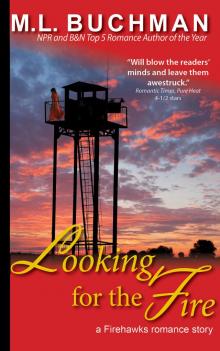 Looking for the Fire
Looking for the Fire Love Behind the Lines
Love Behind the Lines Peter's Christmas
Peter's Christmas In the Weeds
In the Weeds Christmas at Henderson's Ranch
Christmas at Henderson's Ranch They'd Most Certainly Be Flying
They'd Most Certainly Be Flying Fire at Gray Wolf Lookout (Firehawks Book 8)
Fire at Gray Wolf Lookout (Firehawks Book 8) Wildfire on the Skagit (Firehawks Book 9)
Wildfire on the Skagit (Firehawks Book 9) A Hotshot Christmas
A Hotshot Christmas Off the Leash
Off the Leash Where Dreams Books 1-3
Where Dreams Books 1-3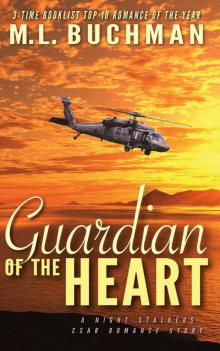 Guardian of the Heart
Guardian of the Heart The Ides of Matt 2017
The Ides of Matt 2017 Where Dreams Unfold
Where Dreams Unfold Twice the Heat
Twice the Heat Wild Justice (Delta Force Book 3)
Wild Justice (Delta Force Book 3) Flying Over the Waves
Flying Over the Waves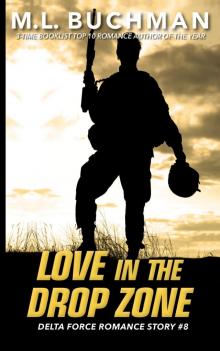 Love in the Drop Zone
Love in the Drop Zone I Own the Dawn: The Night Stalkers
I Own the Dawn: The Night Stalkers What the Heart Holds Safe (Delta Force Book 4)
What the Heart Holds Safe (Delta Force Book 4) The Christmas Lights Objective
The Christmas Lights Objective Road to the Fire's Heart
Road to the Fire's Heart Night Rescue
Night Rescue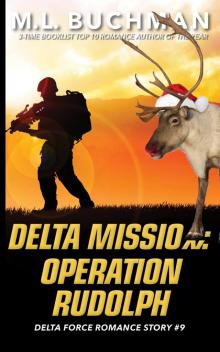 Delta Mission: Operation Rudolph
Delta Mission: Operation Rudolph Full Blaze
Full Blaze Night Is Mine
Night Is Mine Lightning Strike to the Heart
Lightning Strike to the Heart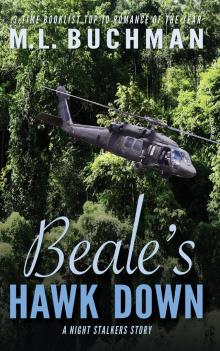 Beale's Hawk Down
Beale's Hawk Down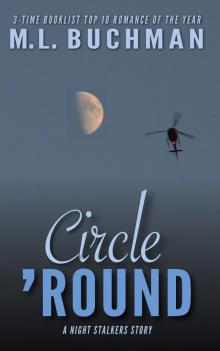 Circle 'Round
Circle 'Round Cookbook from Hell Reheated
Cookbook from Hell Reheated Zachary's Christmas
Zachary's Christmas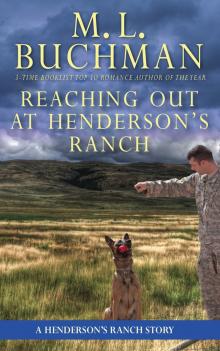 Reaching Out at Henderson's Ranch
Reaching Out at Henderson's Ranch Fire Light Fire Bright
Fire Light Fire Bright The Ides of Matt 2016
The Ides of Matt 2016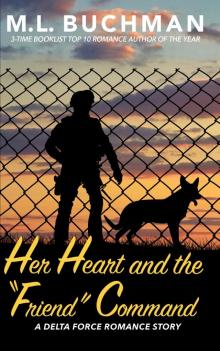 Her Heart and the Friend Command
Her Heart and the Friend Command On Your Mark
On Your Mark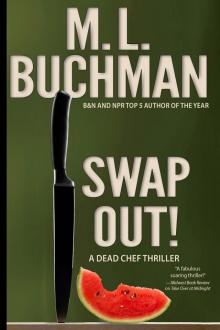 Swap Out!
Swap Out! Heart of the Cotswolds: England
Heart of the Cotswolds: England The Phoenix Agency_The Sum Is Greater
The Phoenix Agency_The Sum Is Greater Wildfire at Larch Creek
Wildfire at Larch Creek Target Lock On Love
Target Lock On Love Second Chance Rescue
Second Chance Rescue Where Dreams Are Written
Where Dreams Are Written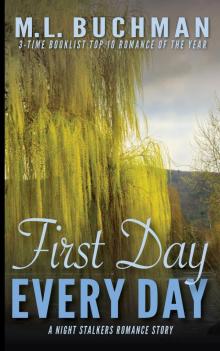 First Day, Every Day
First Day, Every Day Christmas at Peleliu Cove
Christmas at Peleliu Cove Heart Strike
Heart Strike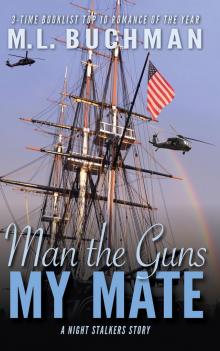 Man the Guns, My Mate
Man the Guns, My Mate Emily's Wedding
Emily's Wedding Daniel's Christmas
Daniel's Christmas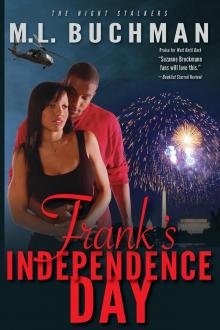 Frank's Independence Day
Frank's Independence Day The Phoenix Agency: The Sum Is Greater (Kindle Worlds Novella)
The Phoenix Agency: The Sum Is Greater (Kindle Worlds Novella)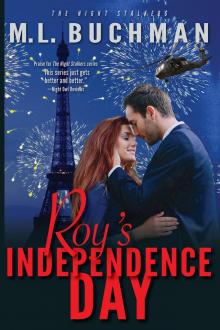 Roy's Independence Day
Roy's Independence Day